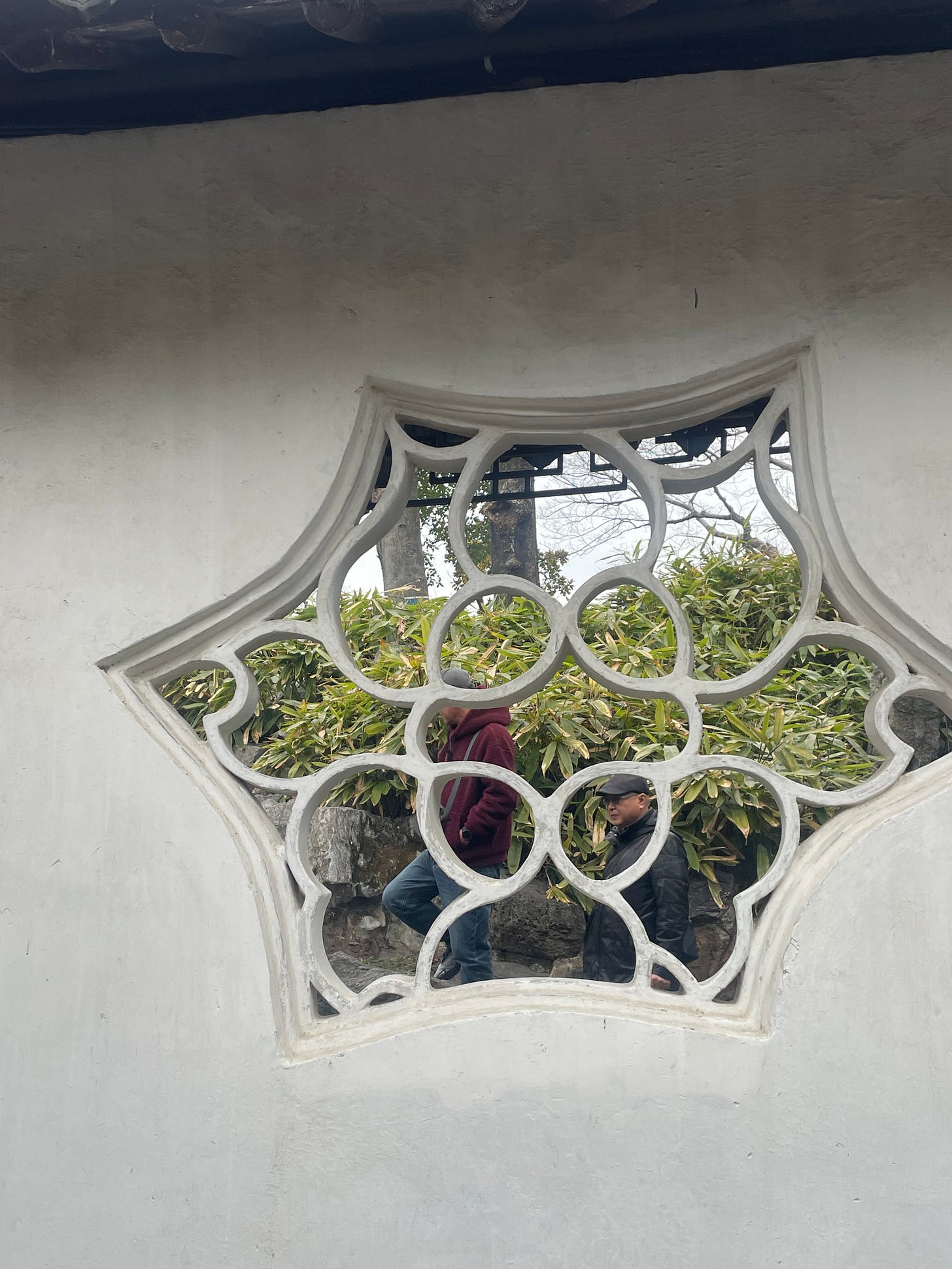They say that some keys to reading a Suzhou garden are to pay attention to:
Dark against light,
Small against large,
Artificial against natural.
She never took much interest in Suzhou gardens because of their artificial nature. Every detail seemed so meticulously designed that it lacked spontaneity. But, as her dad had said, “It’s an art form the Japanese copied and glorified,” so they might as well go and learn.
To give more credit, Suzhou garden is also an art form that lives on, preserved by constant care. The plants must be trimmed, maintained, and nurtured over hundreds of years, sometimes spanning three generations. “Foreigners tried to copy it but failed because they can’t replicate the environment that’s been preserved for centuries,” a TV host explained in a 1999 documentary. Entering a Suzhou garden feels like stepping into a living Chinese painting — time frozen in the 1300s.
She still doesn’t know the best way to read a garden. It was a hazy morning when they visited two small gardens. Once inside, it felt like a maze. Every turn revealed a new sight, where plants, paintings, furniture, and sometimes rocks flowed seamlessly together. The windows, often square, framed the scenery. A plant cut off halfway in the frame perfectly complemented an armchair.
Visitors become part of the scene too, fragmented and framed. Sometimes they poke their heads out of the frame, shifting from 2D to 3D.
Dark, light, small, large, artificial, natural — they all seem to embody yin and yang, existing on opposite ends of a spectrum, one unable to exist without the other.
In one picture, two men are captured. The man on the right is her father, on the left, her uncle. Yin and yang in personalities.
If examined closely, you can tell that the father is stiff, his body in pain, but he doesn’t complain, for that would make him seem weak. His brow furrows, tightly knit, as he observes others in silence.
Sometimes he fades into a rock, his body solid and heavy, with a weight that seems to reside inside him. Maybe you’d want to push this rock away, but then you’d worry about losing it forever.
The uncle, however, is different — flexible, like water. His mind is quick, jumping from one question to another. Like when she asked him why a hotel had a flexible delay policy, he explained that the decision was based on research and calculated probability. He added, “You can’t make money by counting pennies. Real success comes from providing value to customers. That’s how you build scale, and customers return because they trust you — that’s the key to long-term growth.”
That conversation was more valuable than any MBA class she had taken.
The uncle is penniless, made poor judgment calls on his retirement house, and now lives in a community without enough electricity. He didn’t have much savings and has always been someone who lived paycheck to paycheck. Uncle’s son is an influencer/businessman who accumulated millions. Uncle agreed to let his son skip college and passed down all of his street smarts, which his son cashed in on and turned into gold in this attention-driven economy.
It was a gamble and a social experiment.
Her dad, on the other hand, always follows a set path. He types out destinations word by word instead of taking shortcuts. He retrieves the info even when everyone else groans. He’d send commands like “Hurry up, let’s leave now” in the family group chat, always wanting to be the one in charge.
Moving from one sight to another, his attention often fixates on his phone, where he tracks stock trades. “It’s a good day,” he declares, showing his daughter how he turned thousands into a profit over two years. He calls it winning, though he doesn’t seem to enjoy the present moment — he’s focused on bringing home the bacon. The dad accumulated enough money to send his daughter to study overseas for a decade, only to return penniless because she chose to become a writer. And now, she’s on her way to another graduate degree. She doesn’t have to worry about money, nor does she have any money.
Her father has become rigid with age, stubborn in his ways, less prone to change. It’s frightening because she sees a reflection of herself in him — how she’s grown more rigid compared to her younger friends. They type furiously in group chats while she struggles to keep up. She follows a certain way, while they offer more flexible solutions. She’s rigid because she can’t catch up, trapped in resentment and frustration.
Her father suffers because he views the uncle as his enemy. In turn, he suffers, but the uncle doesn’t. She often feels she’s like that too. She put herself in competition with her millionaire cousin, blinded by envy.
The garden seems to speak in riddles — where stones rest with purpose, plants reach out towards the light, and even the smallest crack in the design feels intentional. As she walks through the garden, she sees her own reflections in the interplay of opposites. The rigidness of the stone, the fluidity of the plants, the quietness of the space — it’s not about choosing one or the other, but finding how they can coexist.






